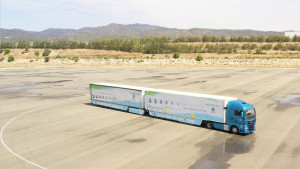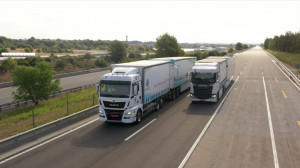AEROFLEX project: Aerodynamic and Flexible Trucks for Next Generation of Long-Distance Road Transport
The AEROFLEX project started in October 2017 with the aim of developing and demonstrating new technologies, concepts and architectures for complete vehicles that are energy efficient, safe, comfortable, configurable, and cost-effective. At the same time, they should meet customers’ demands by being flexible and adaptable regarding the continuously changing operational conditions. These new configurable truck concepts should meet the future logistics and co-modality needs for varied segments and markets.
Applus+ IDIADA’s scope in the AEROFLEX project was the protection of Vulnerable Road Users (VRU) in case of pedestrian impact against trucks and the active safety systems that aim to anticipate, prevent, or minimise the effects of an accident. The Applus+ IDIADA team performed the complete validation activities (fuel consumption, airdrag and dynamic tests), analysed the regulatory framework, and organised the workshops with the sounding board members.
The initiative, launched in 2017, was led by a consortium of 23 international partners. These include six truck manufacturers (MAN, IVECO, SCANIA, VOLVO, DAF and FCA), three semitrailer manufacturers (VECK, SCHMITZ CARGOBULL and Tirsan Solutions), three universities (Chalmers, HAN and MHH), seven research centres (Uniresearch, DLR, Fraunhofer, NLR, Transport & Mobility Leuven, UIRR and TNO), three industrial companies (ZF, Michelin and CREO), and Applus+ IDIADA, a specialist in vehicle design, engineering, testing and homologation.
AEROFLEX project’s main objectives
The AEROFLEX project targeted an efficiency improvement of up to 33% in Long Haul road transport based on new standards for hybrid-distributed powertrain, aerodynamic devices for complete vehicle, utilisation of loading units, performance-based standards (PBS), and access to infrastructure in a multi-mode context, as indicated in the following figure:

Main results of the AEROFLEX project
As for the main tangible results obtained by the AEROFLEX project partners, it is important to highlight the characterisation of the European freight transport market by taking into account its main traits when it comes to map distribution, volume and evolution predictions, as well as data regarding the drivers, the constraints, the trends, the mode and vehicle choice criteria. Moreover, new concepts and technologies were also developed pursuing the drag reduction, the safety, comfortability, configurability, and cost-effectiveness that, overall, ensure customer needs are met under varying transport requirements and conditions.
Additionally, the AEROFLEX project has been able to demonstrate potential truck aerodynamics and energy management improvements thanks to associated impact assessments of the new vehicle concepts, technologies and features developed during this 4-year project. These are the following:
- An Energy Management Powertrain architecture for distributed powertrains
- A Smart Steerable Dolly for EMS vehicles and automated yard operations
- Active Aerodynamic Devices for the complete vehicle, adaptable to the logistics task
- Smart Loading Units and Tools for more effective loading space utilisation and multimodal transport
- Front-end design for more safety and survivability for driver and Vulnerable Road User
To implement these new developments, the AEROFLEX project team drafted a coherent set of recommendations for standards and legislative frameworks revision in order to allow the new aerodynamic and flexible vehicle concepts on European roads.
Applus+ IDIADA’s AEROFLEX project outcomes
Applus+ IDIADA’s main outcomes in the project focused on the improvements of truck design to decrease injuries in the event of an accident, as well as the development and application of ADAS technology simulations applied on trucks. The outcomes were the following:
- Heavy duty front-end design for passive safety
- Vehicle design validation and vulnerable road user protection
- Active safety: truck to commercial vehicles, pedestrian, cyclist and cars
- Braking performances analysis of different vehicle configuration
- Standard truck with single trailer
- Longer / heavier vehicle

In addition, the Applus+ IDIADA team developed new validation testing methodologies for European Modular System trucks, covering the definition of an initial test matrix comprehending 11 types of vehicles. New fuel consumption methodologies were also implemented, allowing more accurate results, which were comparable with those obtained on test tracks and real routes with different types of vehicles, seasons of the year, and locations.
A new airdrag methodology was similarly developed as per Regulation RC 2017/2400, with the objective of certifying the CO2 emissions for commercial vehicles over 7.5 tones using a Vehicle Energy Consumption Calculation Tool (VECTO). Other dynamic tests were performed at Applus+ IDIADA’s test tracks according to the Standards and Vehicle Assessment Rules of the National Transport Commission of Australia. As a result, a new test protocol was implemented, allowing the evaluation of the correct behaviour of European Modular Vehicles.


Regarding the recommendations and roadmap for a new regulatory framework, Applus+ IDIADA’s specialists defined the current state of EU legislation, projection of the possible solutions to the regulatory framework and validation of developed technologies. In addition, they edited a book of recommendations and roadmap for a new regulatory framework, and coordinated and analysed the results with the Sounding Board.
AEROFLEX project’s final event
The final event of the AEROFLEX project was held on the 28th of September at the ZF Test Track in Jeversen, Germany. During the fully packed day, over 80 guests attended the event live at the ZF premises and another 100 to 200 guests from around the world joined online. During this hybrid-event, several presentations about the project’s processes and results were shared with the audience.
The presentations alternated with live demonstrations of the AEMPT and Smart Power Dolly, European modular system (EMS), and AEROLOAD on the Test Track. The Smart Loading Units, the Cargo Volume Detection, and the Puzzle Software & van Eck Trailer were demonstrated.
The event concluded with a vibrant discussion by the esteemed AEROFLEX-panel, which broached topics for more efficient innovations for safer transport contributing to the zero-emission, including legislative adaptations. The panel discussion had an especially interesting dynamic by the participation of two representatives from the European Commission. Overall, the panel shared a positive outlook on the future for energy-efficient long-haul road freight transport.